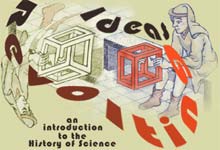
University of California, Irvine
Instructor: Dr. Barbara J. Becker

|
Week 4. Heavenly Reading The Book of Nature vs. The Book of Scripture
|
Supplementary readings for Week 4's lectures include excerpts
from:
|
Galileo began compiling a collection of essays on motion around 1590. The essays, collectively known as De Motu, represent his earliest thoughts on what would become the new science of kinematics. In them, the modern day reader is offered a rare glimpse of a great mind struggling with disparities between the prevailing written authority (Aristotle, in this case) and the directly observable book of nature. Galileo never published these essays.
In what ways does Galileo break with traditional views on how things move? In what ways does he show he is still adhering to traditional views? How does he make his arguments in De Motu? Do you think he is convincing?By contrast, the Dialogue on the Two Chief World Systems is an example of Galileo's mature writing. At the time he wrote this book, there were actually three world systems being discussed in academic circles: the geocentric system of Claudius Ptolemy (fl. 125), Copernicus' heliocentric system, and the geo-heliocentric system of the Danish astronomer, Tycho Brahe (1546-1601).
Which two of these three does Galileo include in his dialogue? Why do you think he left out the third one?Galileo was thirty years old when René Descartes was born. By the time Descartes began his philosophical investigations, there was still no agreement on how the earth, moon, moving stars (i.e., sun and planets) and fixed stars were physically arranged.
Like Galileo, Descartes championed Copernicus' system, but not as an alternative to Ptolemy's. In Descartes' view, Ptolemy's system wasn't even worth mentioning anymore!
What had changed in the intervening years? How does Descartes' argument differ from Galileo's in both style and content?
|